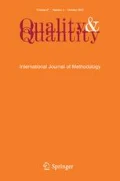Abstract
The aim of this study is to find the effects of the answer based computer assisted mathematics instruction at geometry on students’ success and attitudes. In the study, experimental research model with pre-test post-test control group was used. The participants of the study composed of 78 students who attended the 8th grade secondary school in Northern Cyprus under the Ministry of National Education in the fall semester of 2017–2018. In order to reveal students’ success and mathematics attitude “Math Attitude Scale” and “Success Test” were used as the data collection tools. While the traditional teaching method was applied in the control group, computer assisted mathematics teaching was applied in the experimental group using answer based software. As a result, the answer-based computer assisted mathematics teaching method applied in the experimental group has an important effect in improving the academic achievement of the students but no significant difference found in the mathematics attitudes of the students.
References
Aktümen, M., Kaçar, A.: İlköğretim 8. sınıflarda harfli ifadelerle işlemlerin öğretiminde bilgisayar destekli öğretimin rolü ve bilgisayar destekli öğretim üzerine öğrenci görüşlerinin değerlendirilmesi. Kastamonu Eğitim Dergisi 11(2), 339–358 (2003)
Awofala, A.O.: Assessing senior secondary school students’ mathematical proficiency as related to gender and performance in mathematics in Nigeria. Int. J. Res. Educ. Sci. 3(2), 488–502 (2017)
Baki, A.: Öğrenen ve öğretenler için bilgisayar destekli matematik. Tübitak Bitav-Ceren Yayınları, İstanbul (2002)
Büyükkarcı, A., Müldür, M.: Teknoloji kullanımının yazma becerisine yansımalarına ilişkin öğretmen görüşleri. J. Suleyman Demirel Univ. Inst. Soc. Sci. 27(2), 22–38 (2017)
Chemwei, B.: Frequency of use of information and communication technology equipment by secondary school heads and teachers in Nandi and Uasin Gishu Counties, Kenya. Mara Res. J. Humanit. Soc Sci. 1(1), 21–30 (2017). ISSN: 2519-1489
Ching, B.H.H., Nunes, T.: Children’s understanding of the commutativity and complement principles: a latent profile analysis. Learn. Instr. 47, 65–79 (2017)
Good, S., Clarke, V.B.: An integral analysis of one urban school system’s efforts to support student-centered teaching. In: Keengwe, J., Onchwari, G. (eds.) Handbook of Research on Learner-Centered Pedagogy in Teacher Education and Professional Development, pp. 45–68. IGI Global, Hershey (2017)
Harris, J., Bourne, P.A.: Perception of teachers and pupils on factors influencing academic performance in mathematics among a group of fifth and sixth graders in Jamaica. Int. J. Transf. Appl. Math. Stat. 2(1), 1–23 (2017)
İçel, R.: Bilgisayar destekli öğretimin matematik başarısına etkisi: Geogebra örneği. Unpublished Master Thesis, Selçuk University, Konya, Turkey (2011)
Kepçeoğlu, İ., Yavuz, İ.: The effect of GeoGebra on achievement of preservice mathematics teachers about concepts of limit and continuity. Necatibey Fac. Educ. Electr. J. Sci. Math. Educ. 11(1), 21–47 (2017)
Kutluca, T.: The effect of geometry instruction with dynamic geometry software; GeoGebra on Van Hiele geometry understanding levels of students. Educ. Res. Rev. 8(17), 1509 (2013)
Nazlıçiçek, N., Erktin, E.: İlköğretim matematik öğretmenleri için kısaltılmış matematik tutum ölçeği. Ulusal Fen Bilimleri ve Matematik Eğitimi Kongresi 16–18 (2002)
Plano Clark, V.L., Creswell, J.W.: Understanding research: a consumer’s guide. Pearson Education, Upper Saddle River (2015)
Shadaan, P., Leong, K.E.: Effectiveness of using GeoGebra on students’ understanding in learning circles. Malays. Online J. Educ. Technol. 1(4), 1–11 (2013)
VanLehn, K. (2008). The interaction plateau: answer-based tutoring < step-based tutoring = natural tutoring. In: International Conference on Intelligent Tutoring Systems. Springer, Berlin, pp. 7-7
Yushau, B.: The effects of blended e-learning on mathematics and computer attitudes in pre-calculus algebra. Math. Enthus. 3(2), 176–183 (2006)
Zengin, Y., Furkan, H., Kutluca, T.: The effect of dynamic mathematics software geogebra on student achievement in teaching of trigonometry. Procedia Soc. Behav. Sci. 31, 183–187 (2012)
Author information
Authors and Affiliations
Corresponding author
Rights and permissions
About this article
Cite this article
Tezer, M. The effect of answer based computer assisted geometry course on students success level and attitudes. Qual Quant 52, 2321–2329 (2018). https://doi.org/10.1007/s11135-017-0666-5
Published:
Issue Date:
DOI: https://doi.org/10.1007/s11135-017-0666-5

